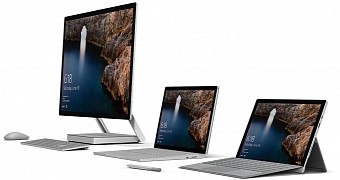Microsoft’s Surface is already a very successful product and the J.D. Power 2017 U.S. Tablet Satisfaction Study is here to confirm it, with the Redmond-based software giant getting the first place ahead of rivals Apple and Samsung.
Microsoft received 855 points for its Surface tablet, while Apple and Samsung came pretty close with 849 and 847 points, respectively.
The software giant topped the charts for the variety of pre-loaded applications, Internet connectivity, and availability of manufacturer-supported accessories, with J.D. Power saying the company also gets the best score for variety of input/output connectivity, amount of internal storage, size of tablet, quality of materials, and attractiveness of tablet design.
Younger customers than rivals
The research shows that Microsoft has more young customers than its rivals, while a substantial number of buyers pick the Surface because it is “very important” for their jobs. 90 percent of Surface owners said they use it for web browsing (versus 75 percent the Industry average), emailing, word processing, and mobile payments.
“The Microsoft Surface platform has expanded what tablets can do, and it sets the bar for customer satisfaction. These tablet devices are just as capable as many laptops, yet they can still function as standard tablets. This versatility is central to their appeal and success,” said Jeff Conklin, vice president of service industries at J.D. Power.
Microsoft is very committed to improving its Surface lineup and researches like this only show that the company is investing in a product that becomes more compelling for buyers across the world with every new generation.
The next Surface models are expected this year, possibly this spring, as Microsoft is likely to take the wraps off the Surface Book 2 and the Surface Pro 5 anytime soon. A spring hardware event is reportedly prepared, though it’s believed that the Surface Book 2 might not see daylight just yet as the device isn’t ready for public launch.

 14 DAY TRIAL //
14 DAY TRIAL //